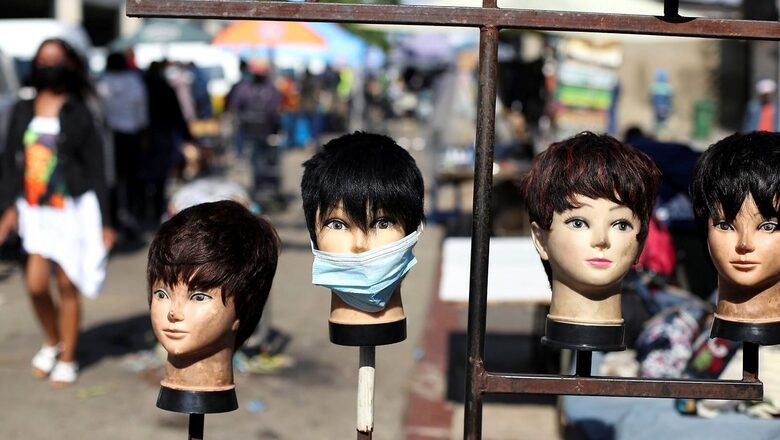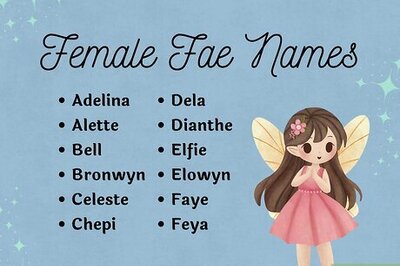
views
Nearly two years into the Covid-19 pandemic, the world raced Friday to contain a new coronavirus variant – B.1.1.529 – potentially more dangerous than the one that has fueled relentless waves of infection on nearly every continent. A World Health Organization panel named the variant “omicron” and classified it as a highly transmissible virus of concern, the same category that includes the predominant delta variant, which is still a scourge driving higher cases of sickness and death in Europe and parts of the United States.
Omicron’s actual risks are not yet understood. But early evidence suggests it carries an increased risk of reinfection compared with other highly transmissible variants, the WHO said. That means people who contracted Covid-19 and recovered could be subject to catching it again. It could take weeks to know if current vaccines are less effective against it.
As a host of countries – the United States, Canada, Russia – restrict travel for visitors from the region, here’s what the top international health body WHO has said till now about the variant:
• A WHO panel – The Technical Advisory Group on SARS-CoV-2 Virus Evolution – reconvened on November 26 to assess this new Covid-19 variant named after a letter in the Greek alphabet.
• The WHO flagged the distinct peak in reported cases in South Africa. From just over 200 new confirmed cases per day in recent weeks, the region has seen the number of new daily cases rocket to 2,465 on Thursday. Struggling to explain the sudden rise in cases, scientists studied virus samples from the outbreak and discovered the new variant. The first known confirmed B.1.1.529 infection was from a specimen collected on 9 November, 2021, the report by the health body said.
• The variant has a large number of mutations, some of which are concerning, the WHO said, adding that according to preliminary evidence, an increased risk of reinfection is assumed with this variant, as compared to other ‘Variant of Concerns’.
• The number of cases of this variant appears to be increasing in almost all provinces in South Africa. Current SARS-CoV-2 PCR diagnostics continue to detect this variant. Several labs have indicated that for one widely used PCR test, one of the three target genes is not detected (called S gene dropout or S gene target failure) and this test can therefore be used as marker for this variant, pending sequencing confirmation. Using this approach, this variant has been detected at faster rates than previous surges in infection, suggesting that this variant may have a growth advantage, the WHO has said.
• The panel has also recommended a host of measures to be followed by countries in the wake of this sordid discovery:
‣ Enhance surveillance and sequencing efforts to better understand circulating SARS-CoV-2 variants.
‣ Submit complete genome sequences and associated metadata to a publicly available database, such as GISAID. The GISAID is a global science initiative and primary source founded in 2008 that provides open access to genomic data of influenza viruses and the COVID-19 coronavirus. The first SARS-CoV-2 whole-genome sequences were made available on GISAID on January 10, 2020, enabling global responses to the pandemic, including the development of the first vaccines and diagnostic tests to detect SARS-CoV-2.
‣ Report initial cases/clusters associated with VOC infection to WHO through the IHR mechanism. The International Health Regulations are an instrument of international law that is legally-binding on 196 countries, including the 194 WHO Member States. The IHR grew out of the response to deadly epidemics that once overran Europe.
‣ Where capacity exists and in coordination with the international community, perform field investigations and laboratory assessments to improve understanding of the potential impacts of the VOC on COVID-19 epidemiology, severity, effectiveness of public health and social measures, diagnostic methods, immune responses, antibody neutralization, or other relevant characteristics. In India, the INSACOG, a consortium of government institutions involved in coronavirus genome sequencing has not yet detected the presence of the variant in the country. According to reports, the experts met on Friday and reviewed the genome sequencing being carried out the country.
• What the panel has said YOU should do:
‣ Individuals are reminded to take measures to reduce their risk of COVID-19, including proven public health and social measures such as wearing well-fitting masks, hand hygiene, physical distancing, improving ventilation of indoor spaces, avoiding crowded spaces, and getting vaccinated, the WHO said in its advisory for the general public after the variant’s discovery. India, since the start of the pandemic, has enforced mask-wearing in public, physical distancing to curb cases.
• The panel has also said it will continue to evaluate the variant and communicate its new findings to member states and the public as needed.
With inputs from the Associated Press.
Read all the Latest India News here



















Comments
0 comment